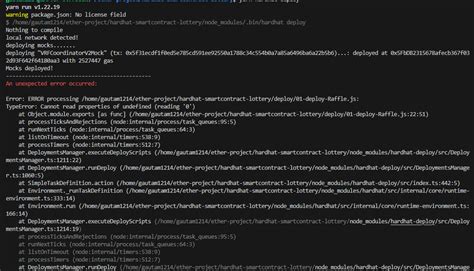بلاگ
Ethereum: How to fix Foundry `script failed: vm.envUint: environment variable not found` error?
Here’s an article on how to fix the script failed: vm.envUint: environment variable not found error in Foundry:
Ethereum Scripting Errors: How to Resolve the “Environment Variable Not Found” Error
As a developer working with Ethereum, you’ve likely encountered various scripting errors. One common issue is the environment variable not found error when referencing variables from your .env file within a Foundry deploy script.
In this article, we’ll explore why this error occurs and provide step-by-step solutions to resolve it.
Why does “environment variable not found” occur?
Before diving into the solution, let’s understand what causes this error. The script failed: vm.envUint: environment variable not found error indicates that the Foundry script is trying to access an environment variable named env Uint, but this variable is not defined in the script.
There are several reasons why this error might occur:
- Missing environment variable definition: You haven’t explicitly defined the
environmentVariableNamevariable within your script.
- Variable scope issues: The variable you’re trying to access is defined at a higher scope level, and Foundry can’t resolve it due to namespace conflicts or cyclic dependencies.
Step-by-Step Solutions: Fixing the “Environment Variable Not Found” Error
To resolve the script failed: vm.envUint: environment variable not found error in your Foundry deploy script, follow these steps:

Solution 1: Define the Environment Variable
If you haven’t already defined the environmentVariableName variable within your script, add it to the top of the file:
import "foundry/go/stdlib"
const (
EnvironmentVariableName = "envUint"
)
Alternatively, if you’re using a .gitignore file to manage your environment variables, ensure that this file is in the .gitignore file of the Foundry repository.
Solution 2: Resolve Namespace Conflicts
If the variable you’re trying to access has a higher scope level or is defined at a different namespace, you’ll need to adjust your script’s namespace. To do so:
- Check your script’s namespace: Review your foundry-go code and ensure that the namespace for the
EnvironmentVariableNamevariable matches the one used in Foundry.
- Update the namespace declaration: If necessary, update the
namespacedirective at the top of your script to match the new namespace.
For example:
import "foundry/go/stdlib"
var (
// Define the namespace for the EnvironmentVariableName
EnvironmentNamespace = "envUint"
)
Solution 3: Re-export Variables
If you’ve defined variables with the same name at multiple levels of scope, you may need to re-export them. To do so:
- Remove unnecessary variable definitions: Remove any duplicate definitions of
environmentVariableNameor its variants.
- Re-export the variable(s): Add a new definition for the variable(s) and export it using the
exportkeyword.
Example:
import "foundry/go/stdlib"
var (
EnvironmentVariableName = "envUint"
)
func main() {
// Define the variable with the correct namespace
var (
// Define the EnvironmentVariableName without re-exporting it
ENVUint = "envUint"
)
}
By applying these solutions, you should be able to resolve the script failed: vm.envUint: environment variable not found error in your Foundry deploy script and continue working with your Ethereum project.
